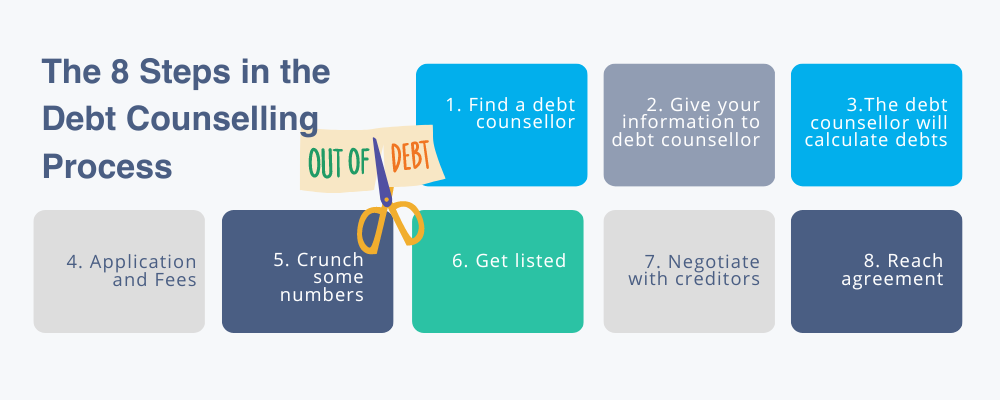Oops, you’ve found yourself drowning in debt, yikes we know it can be scary. Whether you’ve taken out too many credit cards or you’ve piled up personal loans, life happens and it can be very easy as a South African to get caught up in a debt trap. Debt consolidation is a strategy used by many consumers to manage their debts effectively. If you’re struggling with multiple debts or high-interest rates, debt consolidation could be an effective solution to help you manage your finances and get out of debt faster. In this guide, we’ll explain what debt consolidation is, why it’s important, and how it works.
What is Debt Consolidation?
Debt consolidation is a strategy that allows you to combine multiple debts into a single loan. By doing this, you can simplify your debt payments, reduce your interest rates, and possibly lower your monthly payments. The goal of debt consolidation is to make it easier to manage your debt and pay it off faster.
What’s the difference between debt counselling and debt consolidation?
Debt counseling and debt consolidation are both strategies that can help people struggling with debt, but they work in different ways.
Debt counseling is a process where a trained professional helps you review your financial situation and develop a personalized plan to manage your debt. The counselor will assess your income, expenses, debts, and assets to understand your financial situation and suggest ways to improve it. They may also negotiate with your creditors on your behalf to reduce interest rates or monthly payments.
On the other hand, debt consolidation is a method of combining multiple debts into a single, more manageable payment. With debt consolidation, you take out a new loan to pay off your existing debts, leaving you with only one loan payment to make each month. This can make it easier to keep track of your debts and may also result in a lower interest rate, which can save you money over time.
In summary, debt counseling focuses on developing a plan to manage your debts, while debt consolidation is a way to simplify your debts by combining them into one loan. Both approaches can be effective in reducing debt and improving your financial situation, but they work in different ways.
The 8 Steps in the Debt Counselling Process

1. Find a debt counsellor
It is important to not use the services of just any person offering to help you with your debt. To get the full protection of the NCA and to protect you against fraudsters, only use a debt counsellor that is registered with the National Credit Regulator (NCR). These debt counsellors are specifically trained, verified and approved by the NCR. You can verify whether it is a registered debt counsellor by checking their registration certificate. The certificate should have the NCR logo on it and should display the debt counsellors details, as well as their registration number. You can also search for a registered debt counsellor on the NCR’s website.
2. Give your information to the debt counsellor
The debt counsellor will need the information below to best assist you in setting up a repayment plan
- Payslip
- ID document
- Details of your required monthly repayments
- Monthly budget of other expenses such as food, petrol and school fees
3. The debt counsellor will then calculate whether you are over-indebted
Essentially, they will determine whether your debt repayments are unaffordable, taking in to account your current income.
4. Application and Fees
If the debt counsellor confirms that you are over-indebted, you will then be able to officially apply for debt counselling. It is very important that the debt counsellor explains all the applicable fees to you at this stage and that you make sure you fully understand them.
5. Crunching some numbers
The debt counsellor will take the information you provided and do some calculations. He will calculate how much money you need for living expenses and what you can afford to repay every month.
6. Getting listed
The debt counsellor will contact the credit bureaus and inform them of the fact that you are under debt review. They will then list you as such to ensure your full protection. This is not like being blacklisted. Once you have repaid all your creditors, your name will be removed from this list.
7. Negotiating with creditors
The debt counsellor will contact all your credit providers to ensure that the information provided is accurate and to make double sure of the amount that you owe them.
This is NOT like a blacklisting – it’s a protection. It will be removed completely once you’ve paid everything off.
If all the credit providers agree with the repayment proposals offered by the debt counsellor, a legal ‘consent order’ will be obtained. (Often, this could mean a reduction in fees and interest payable by the consumer.)
This means that the terms have been agreed to and can’t be changed independently by any of the credit providers.
Should one or more of the credit providers not like the terms, the debt counsellor will have to approach a magistrate with the proposed debt repayments to get a decision. As long as the repayment plan is reasonable, the court will most likely approve it.
8. Reaching an agreement
Once an agreement has been reached, the debt counsellor will give you your final repayment plan and also submit it to a Payment Distribution Agency.
This agency will take a lump sum from you each month and split it up between the credit providers, according to the repayment plan.
Your obligation is to keep up the monthly payments until such time as the whole amount has been paid off.
But keep in mind, it’s only the solution to bad debt if you handle it with responsibility. While there are some real benefits to debt review, it is important that you do your part in understanding that you are still responsible for your debt.
3 different ways you can consolidate debt by yourself
Personal Loans: You can take out a personal loan and use the funds to pay off your existing debts. Personal loans typically have lower interest rates than credit cards, which can save you money in the long run.
Balance Transfer Credit Cards: Another option is to transfer your existing credit card balances to a new credit card with a lower interest rate. Many credit card companies offer balance transfer promotions with low or 0% interest rates for a limited time.
Home Equity Loans: If you own a home, you can take out a home equity loan or line of credit and use the funds to pay off your debts. Home equity loans typically have lower interest rates than credit cards, but they can be risky because your home is used as collateral.
How Does Debt Consolidation Work?
The process of debt consolidation varies depending on the method you choose. If you opt for a personal loan, you’ll need to apply for a loan and provide information about your income and credit history. If you’re approved for the loan, the funds will be disbursed directly to your creditors, and you’ll be left with a single loan to repay.
If you choose a balance transfer credit card, you’ll need to apply for a new credit card and transfer your existing balances to the new card. You’ll need to pay off the balance before the promotional period ends to avoid paying interest.
If you decide to take out a home equity loan, you’ll need to have your home appraised and apply for a loan. The funds will be disbursed to your creditors, and you’ll be left with a single loan to repay. It’s important to remember that home equity loans are secured by your home, so if you’re unable to make payments, you could risk losing your home.
3 Pros of Debt Consolidation:
1. Lower Interest Rates:
Debt consolidation often offers a lower interest rate than credit cards or personal loans, which can help you save money in the long run.
2. Simplified Payments:
Consolidating your debts means you’ll only have to make one monthly payment, which can simplify your debt management.
3. Extended Repayment Terms:
Debt consolidation loans often offer extended repayment terms, which can lower your monthly payments.
3 Cons of Debt Consolidation:
1. Additional Fees:
There may be fees associated with debt consolidation, such as origination fees or early repayment fees, which can add to your overall debt.
2. Risk of New Debt:
Consolidating your debts doesn’t eliminate them, and you may be tempted to incur new debt on your credit cards or other accounts.
3. Potential to Increase Debt:
Extending your repayment term may lower your monthly payments, but it can also increase your overall debt due to interest charges.
What are the requirements for debt consolidation in South Africa?
- Decent Credit Score: To qualify for debt consolidation, you typically need to have a fair to good credit score.
- Employment: Most lenders require that you have a steady source of income to qualify for a consolidation loan.
- Minimum Debt: Debt consolidation lenders may have a minimum debt requirement, usually around R50,000.
- Collateral: Some lenders may require collateral, such as a home or car, to secure the consolidation loan.
If you’re considering debt consolidation, it’s important to do your research and compare your options carefully. Make sure you understand the terms and conditions of any consolidation loan you’re considering, including any fees or penalties. You may also want to seek advice from a financial advisor or credit counsellor to help you make an informed decision about debt consolidation.
Frequently asked questions about debt consolidation
Will debt consolidation hurt your credit score?
Upon applying for a debt consolidation loan, it is important to know that lenders are required to perform credit checks. Usually, these checks result in hard inquiries, which could lower your credit score by ten points. However, this impact on your score will only last one year. It is also important to note that closing accounts after consolidating balances could have a negative effect on one’s credit on account of the average age of one’s credit history making up fifteen percent of their score. To protect against this decrease, it is best to keep old cards open – even if they are rarely used. Despite the potential for a temporary setback, taking on such a debt management approach can improve your credit score over time due to payment history comprising thirty-five percent of one’s overall score; making timely payments will undoubtedly bolster this key factor.
If you’d like a better understanding of how credit scores work and if debt counselling can help your score or not, then have a look at our Credit Health Course.

Why must debt review fees be paid to your debt counsellors?
Debt Counselling is regulated by the National Credit Act. As part of this process, you’re assigned a monthly repayment amount tailored to your debt-level and other factors. All Debt Counsellors are allowed to collect certain fees, which include: restructuring, administration and application views. For the full rundown on fees Debt Buster give their fee breakdown.






